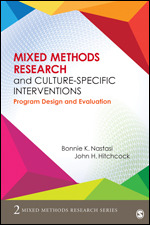Mixed Methods Research and Culture-Specific Interventions
Program Design and Evaluation
- Bonnie K. Nastasi - Tulane University, USA
- John H. Hitchcock - Abt Associates Inc., USA
Mixed Methods Research Series
This practical book shows practicing social scientists and graduate students how to account for cultural factors when developing and evaluating psychological and educational interventions using mixed methods research. Providing a methodological basis for handling cultural influences when engaged in intervention and/or evaluation work, the book covers a range of topics, including mixed methods research, program evaluation, ethnography, and intervention design. Throughout the book, the authors integrate illustrative examples to make more abstract content accessible.
Mixed Methods Research and Culture-Specific Interventions is Volume 2 in the SAGE Mixed Methods Research Series. To learn more about each text in the series, please visit www.sagepub.com/mmrs.
“It is very clear that the authors have an extensive experience applying mixed research methodologies to a variety of interventions in multiple contexts. […T]he main strength in what I have read is that they are very successful in connecting these real-life experiences with the theories that they present in the text; this combination brings new life to the text and help readers to easily identify with the content.”
“This text is different than other books in the field because […] it covers material that is not commonly found in other program evaluation (PE) and performance measurement (PM) texts—especially to this level of detail. It may be more common for other PE and PM books to discuss culture-specific interventions or cultural competency in a part of one chapter, but not have it be the primary focus of the text.”
“I see a lot of value in the consilient approach to methodology the authors are encouraging. I think they have done a nice job selecting and defining important practical approaches.”
Recommended for optional reading
Most of the students selectMixed methods to complete the dissertation.


